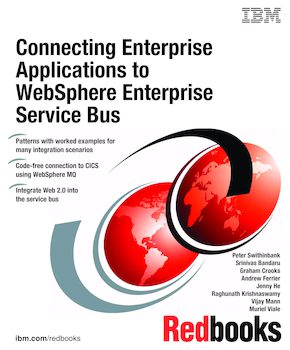Connecting Enterprise Applications to WebSphere Enterprise Service Bus
An IBM Redbooks publication
Note: This is publication is now archived. For reference only.

Published on 20 September 2007, updated 12 February 2008
ISBN-10: 0738488828
ISBN-13: 9780738488820
IBM Form #: SG24-7406-00
Authors: Peter Swithinbank, Srinivas Bandaru, Graham Crooks, Andrew Ferrier, Jenny He, Raghunath Krishnaswamy, Vijay Mann and Muriel Viale
Service Oriented Architecture (SOA) promises a great leap forward in the re-use of applications by simplifying application composition. The technology that simplifies application composition is Service Component Architecture (SCA). SCA is an open component architecture for wiring services together to build composite applications.
WebSphere Enterprise Service Bus provides the on-ramp and off-ramp to incorporate many different applications and services into an SOA solution.
In this IBM Redbooks publication we introduce SCA and how it has evolved from earlier application integration architectures. We explain how WebSphere ESB connects applications and components to the service bus by using adapters and other types of SCA imports and exports.
Our main focus is helping you sort through the many choices that need to be made when deciding how to connect applications together to meet the requirements of a business scenario. We propose six different solution patterns, each with alternative implementations to choose from, to take on most integration scenarios. We also provide seven worked examples of some of the alternatives, which are fully described in the text, and are also available as working samples from the ITSO Redbooks Web site.
Part 1. Background
Chapter 1. Connecting enterprise applications
Chapter 2. Service Component Architecture
Chapter 3. Connecting to the WebSphere Enterprise Service Bus
Chapter 4. Adapters
Part 2. Scenarios and patterns
Chapter 5. Business scenarios
Chapter 6. Connection patterns
Part 3. Working examples
Chapter 7. Historical integration using WebSphere MQ
Chapter 8. Custom CICS integration using WebSphere MQ
Chapter 9. Code-free CICS integration using WebSphere MQ
Chapter 10. Custom application integration using JMS
Chapter 11. Event-driven integration using a JDBC adapter
Chapter 12. Lightweight Web client integration using http
Chapter 13. Lightweight Web service integration using http
Chapter 14. Summary
Appendix A. Additional material
Appendix B. Source listings